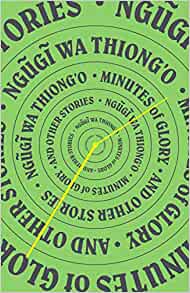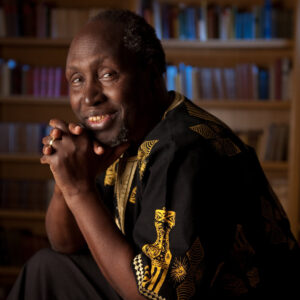by JOSHUA TAIT

Ngũgĩ wa Thiong’o, Minutes of Glory And Other Stories (The New Press, 2019), pp. 208
Minutes of Glory bookends over fifty years of writing by the acclaimed Kenyan author Ngũgĩ wa Thiong’o. The volume makes available in the United States short stories from Ngũgĩ’s formative years in Kenya and Uganda. Primarily written between 1961 and 1971, the painful intersections of gender, class and religion, colonization and the influence of shame that characterize Ngũgĩ’s work emerge from these startling stories. From the opening story “Mugumo,” Ngũgĩ’s allegiance has been with the marginalized and double-marginalized people of society. In it, he traces the experiences of the liminal souls: childless, husbandless women in traditional villages; the victims of British colonialism and flotsam of neocolonialism; and the emasculated men and duped believers of post-Uhuru Kenya.
In the late 1960s, Ngũgĩ renounced Christianity and English as oppressive colonial constructs as he turned toward Marxism informed by the searing, sometimes violent anti-colonial thinker Frantz Fanon. The stories in Minutes of Glory are anti-colonial in intent and practice. Ngũgĩ’s pre-Marxist writings draw attention to various power structures and their victims. But the stories written as “Secret Lives” from 1970 see Ngũgĩ’s satirical vision sharpen. He skewers the absurdities of settler dogma, Kenyan class mores, and, perhaps most consistently, the Christianity implicated in Kenya’s colonial wound. The final stories in this collection are from the early 2010s and differ in tone. The first story is wistful, although not nostalgic; the second ventures into magical realism as it satirizes religious hypocrisy. The collection of four somewhat thematic, loosely chronological sections illustrates not only the development of a powerful anti-colonial voice, but the hidden glories and tragedies and silent shames of colonial and postcolonial Kenya. The first section, “Of Mothers and Children,” is the work’s most somber and impressionistic. Its three stories turn on the precariousness of life for women on the margins of rural peasant society, following women marked by the social death of childlessness. In “Mugumo,” Ngũgĩ’s first published work, a young woman despairs.
“Two seasons, three seasons, and the world she knew began to change. She had no child.
A thata. A barren woman!
No child to seal the bond between him and her!
No child to dote on, hug and scold!
No child to perpetuate the gone spirits of
Her man’s ancestors and her father’s blood.”
But is blessed—perhaps by God, perhaps by the god of an ancestral tree—with pregnancy. In “And the Rain Came Down!,” a childless woman experiences a sort-of surrogate birth by rescuing a lost child. These hard-won triumphs make the contrast of a double loss of a husband and a son in “Gone with the Drought” all the more stark. Ngũgĩ is not accusatory in “Of Mothers and Children.” He, instead, is unsentimental about peasant life and especially its disregard for the women with whom Ngũgĩ suffers.
“Fighters and Martyrs” features more complex and varied stories as Ngũgĩ addresses the class, religious and racial tensions of midcentury Kenya. Both “The Village Priest” and “The Black Bird” wrestle with Christianity and its role in colonization of Kenya and Kenyan and African identity. “The Village Priest,” one of Ngũgĩ’s earlier stories, stands out for its suggestion of the author’s own struggle with Christianity. Joshua, the village priest, is a failed apostate, mocked by the tribal rain-maker. Meanwhile, a white priest, “Livingstone,” is at times genuinely Christlike, yet can only be alien to the village and implicated in the colonial project. Ngũgĩ’s later commentary on religion takes a harder edge. In “The Ghost of Michael Jackson,” written in 2011, Ngũgĩ excoriates the Catholic, Protestant, Muslim, Jewish and Hindu would-be colonizers, “colored with all hues of hate,” for imprisoning God in their houses of worship.
Most of these stories focus on the lives of African subjects, although two train their focus on white settlers. “The Martyr” ruthlessly skewers settler liberalism. In a scene that anticipates J.M. Coetzee’s deconstruction of white liberal South Africa, Ngũgĩ depicts a morning tea of landowning women discussing a wave of violence. The host, Mrs. Hill, cares for the African workers she unthinkingly exploits.
“Tea was brought. They drank, still chatting about the death, the government’s policy, and the political demagogues who were undesirable elements in this otherwise beautiful country. But Mrs. Hill maintained that these semi-illiterate demagogues who went to Britain and thought they had education did not know the true aspirations of their people. You could still win your ‘boys’ by being kind to them.”
Shifting tone from irony to rage and perspective away from Hill, we learn the woman’s favorite “houseboy,” Njoroge, plots her murder as a revolutionary act. Ngũgĩ plays with the master-slave dialectic. Ultimately, it is Njoroge’s recognition of Hill as a person that saves her life. He writes that Hill:
“suddenly crystalized into a woman, a wife, somebody like Njeri or Wambui, and above all, a mother. He could not kill a woman. He could not kill a mother. He hated himself for this change. He felt agitated. He tried hard to put himself in the other condition, his former self, and see her as just a settler. As a settler, it was easy.”
In “The Martyr,” Ngũgĩ observes the necessary violence of Fanonism but ultimately recoils at its demands. Meanwhile, “Goodbye Africa,” a story of a white couple leaving the continent, treats the entire colonial project as puffed up, racist absurdity. A drunk retiree colonel who speaks of the “colonizing mission” and “British capitalism” feels himself cast out of an Edenic Africa in a reenactment of the Fall. He writes unironically that “the white man in Africa must accept a more stringent moral code in the family and in the society at large. For we must set the ideals to which our African subjects must aspire.” Of course, he knows nothing of Africa and is angered and shaken by the African turn from servility to anger and arrogance and is cuckolded by a young African man who haunts his dreams.

The scars of colonialism run deep in Ngũgĩ’s stories about an independent Kenya. An original humiliation at the hands of assimilated Africans drives the embourgeoisement and Christianization of a free man in “Wedding at the Cross.” Indeed, the embourgeoisement of Kenyan society, the African embrace of the colonial church, and tension between modernity and tradition come to a head in a bride’s fateful “no.” “The Mubenzi Tribesman” partly inverts the narrative of “Wedding at the Cross” as the young hope of a village succumbs to middle-class urban habits before destroying himself to meet the demands of conspicuous consumption. In the devastating “Meeting in the Dark,” the impossible strains of these fault lines are enacted violently on the least in society—as always, a woman—as Ngũgĩ shows the brunt of Kenya’s pain is borne by those with the least agency.
“Secret Lives,” is in many ways the centerpiece of the collection (and was, in earlier editions, the title of this collection). Written in 1970, three of the longer stories of the collection deal pessimistically, but humanely with postcolonial Kenya. Marxist, yes, but with a humanity and comic eye that reminded me of Steinbeck’s Cannery Row. Ngũgĩ’s characters, like the unbeautiful bargirl of “Minutes of Glory” and the there-but-for-the-grace-of-God drunken watchman of “The Mercedes Funeral,” are hard luck men and women whose steadily narrowing options dramatize the broader features– corrupt politics, shallow religion, class oppression, the persistent effect of colonialism – of modern Kenya. Ngũgĩ’s eye for enlivening detail and ironic punchline give these stories a bawdy sense of inhabitation. He gives us drunken commentary from a bar in “The Mercedes Funeral.”
“You don’t make laws by sitting in your home drinking Chang’aa and playing draughts. For the student he had only scornful laughter: intellectual workers… he means intellectuals whose one speciality is stoning other people’s cars and property! Gentlemen… there was nothing in the campaign, no issues, no ideas… just promises. People were bored. They did not know whom to choose although the non-arguments of the aspiring businessman held more sway. You, your bottle is still empty… you want to change to something stronger?”
By the end, a poor man is dead, the student radical has sold out, the businessman ruined, a farmer-chief too and the incumbent still in office. And the narrator? “Four years from now… you never know. Gentleman… how about one for the road?”
Minutes of Glory is a potent, if tonally uneven, introduction to Ngũgĩ, the moralist and political writer whose best stories never lose sight of the human beings buffeted by wider forces. We see Ngũgĩ’s development both as a writer and political thinker and experience his short fiction at three critical moments of his life: the beginning of his career, after an intellectual leap, and reflecting upon a life in arts. Throughout, Ngũgĩ, despite his renunciation of Christianity, acts as the biblical prophet Nathan, whose tale of injustice first outraged, then implicated, and finally convicted a king.

